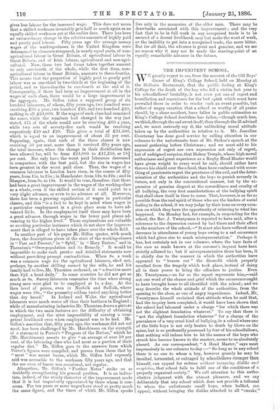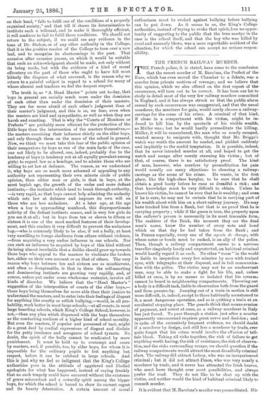THE IMPENITENT SCHOOL.
WE greatly regret to see, from the account of the Old Boys' dinner of King's College School, held on Monday at the Holborn Restaurant, that the public feeling at King's College for the death of the boy who fell a victim last year to his schoolfellows' brutality, is not even yet one of regret and humiliation and repentance for the bad spirit which must have prevailed there in order to render such an event possible, but rather of angry vexation that a school so worthy of all praise should, by a sheer accident, have fallen in public estimation as King's College School doubtless has fallen,—though much less, we think, through the sad event itself, than through the ill-advised and, we must seriously say it, the unblushing moral attitude taken up by the authorities in relation to it. Mr. Josceline Courtenay has done good service by calling attention in our columns to the unfortunate tone of Dr. Stokoe's speech at the annual gathering before Christmas ; and we must add to his expression of regret our own expression not only of regret, but of unfeigned surprise, that Bishop Temple, whose high moral enthusiasm and great experience as a Rugby Head Master would have given weight to every word he said, should rather have thrown his shield over the school, than have confessed with some- thing of passionate regret the greatness of the evil, and the deter- mination of the authorities and the boys to punish severely in future, not only in the conventional manner, but by the ex- pression of genuine disgust at the cowardliness and cruelty of all bullying, the very first manifestations of the bullying spirit that shall show itself in time to come. That, however, is as far as possible from the real spirit of those who are the leaders of social feeling in the school, if we may judge by their tone on every occa- sion on which they have the opportunity of referring to what has happened. On Monday last, for example, in responding for the school, the Rev. J. Twentyman is reported to have said, after a reference to the depression caused by bad times and their effect on the numbers of the school,—" It must also have suffered some decrease in attendance of young boys owing to a sad occurrence which had given rise to much misrepresentation." Perhaps it has, but certainly not in our columns, where the bare facts of the case as made known at the coroner's inquest have been strictly adhered to ; but if misrepresentation there has been, it is chiefly due to the manner in which the authorities have appeared to " brazen out " the discredit which properly resulted from the tragedy which took place, instead of doing all in their power to bring the offenders to justice. Even Mr. Twentyman,—so far as the report represents him,—said not one word of the shame and grief which the occurrence ought to have brought home to all identified with the school ; and we may describe the whole attitude of the authorities, from the opening to the close, as one of angry impenitence. Indeed, Mr, Twentyman himself sustained that attitude when he said that, had the inquiry been completed, it would have been shown that the school had laboured under a charge "for which there was not the slightest foundation whatever." To say that there is " not the slightest foundation whatever" for a charge of the prevalence of a very cruel kind of bullying, in a school where one of the little boys is not only beaten to death by blows on the spine, but is so profoundly possessed by fear of his schoolfellows, that nothing will induce him to let the names of the boys who struck him become known to the masters, seems to us absolutely absurd. As our correspondent, "A Head Master," says most impressively in our columns to-day :—" So long as in any school there is no one to whom a boy, however grossly he may be insulted, tormented, or outraged by schoolfellows stronger than himself, can appeal for redress without incurring dislike and
suspicion, that school fails to fulfil one of the conditions of a properly organised society." We call attention to this autho- ritative judgment with the utmost pleasure, and we say deliberately that any school which does not provide a tribunal to whom the unfortunate small boys, when bullied, can , appeal, without bringing the dislike attached to all "sneaks"
on their head, " fails to fulfil one of the conditions of a properly organised society," and that till it shows its determination to institute such a tribunal, and to make it thoroughly efficient, it will continue to fail to fulfil those conditions. We should not return to the subject, if we could see any evidence in the tone of Dr. Stokoe, or of any other authority in the College, that it is the positive resolve of the College to turn over a new leaf, and to recognise its shortcomings in the past. That occasion after occasion passes, on which it would be suitable that such an acknowledgment should be made, not only without its being made, but with the evidence of a kind of moral effrontery on the part of those who ought to have felt most bitterly the disgrace of what occurred, is the reason why we return to a painful subject in regard to a school for many of whose alumni and teachers we feel the deepest respect.
The truth is, as "A Head Master" points out to-day, that boys in general are socially mach more under the dominion of each other than under the dominion of their masters. They are far more afraid of each other's judgment than of their master's judgment, and this is so, we fear, even when the masters are kind and sympathetic, as well as when they are harsh and exacting. That is why the "Courts of Monitors or Prefects " are probably more efficient for the protection of the little boys than the intervention of the masters themselves,— the masters exercising their influence chiefly on the elder boys, and only through them on the mass of the school in general. Now, we think we must take this fear of the public opinion of their companions by boys as one of the main facts of the case, one not likely to be altered, one, indeed, probably due to the tendency of boys (a tendency not at all equally prevalent among girls) to regard law as a bondage, and to admire those who are willing to set law at defiance. The reason, as we understand it, why boys are so much more ashamed of appealing to any authority not representing their own minute circle of public opinion, than either men or girls, is that in boys, at the most boyish age, the growth of the ruder and more defiant instincts,—the instincts which tend to break through authority, —is very rapid, so that boys cannot help admiring the audacity which sets law at defiance and imposes its own will on those who are less audacious. At a later age, at the age when a boy is approaching manhood, this disproportionate activity of the defiant instincts ceases, and in very few girls do you see it at all ; but in boys from ten or eleven to fifteen or sixteen it is one of the most marked features of their develop- ment, and this renders it very difficult to prevent the audacious boy,—who is extremely likely to be also, if not a bully, at least very unwilling to forego obedience from others without violence, —from acquiring a very undue influence in our schools. Nor can such an influence be acquired by boys of this kind without its being almost inevitable that a dislike should grow up towards those boys who appeal to the masters to vindicate the broken law, either on their own account or on that of others. The very reason why boys between ten and sixteen are so mischievous, and often so disagreeable, is that in them the self-asserting and domineering instincts are growing very rapidly, and, of course, unless put under some wholesome restraint, involve all kinds of disorder. We believe that the "Head Master's" suggestion of the interposition of courts of the elder boys,— those boys being themselves far more able than their juniors to understand the masters, and to enter into their feelings of disgust for anything like cruelty or selfish bullying,—would, in all pro- bability, work better in most large schools,—at all events, in most large boarding schools, which King's College School, however, is not,—than any plan which dispensed with the boys themselves as the conducting medium of a higher kind of school morality. But even the masters, if popular and possessed of tact, might do a great deal by cordial expressions of disgust and disdain for the petty insolence and arrogance of school tyrants. No doubt, the spirit of the bully cannot be eradicated by mere punishment. It must be held up to contempt and scorn by masters, and, if possible, too, by elder boys, for whom it is impossible for the ordinary pupils to feel anything but respect, before it can be subdued in large schools. And this is just why we feel so indignant that the King's College authorities pose in the attitude of aggrieved and libelled apologists for what has happened, instead of saying frankly that no such tragedy could have occurred without the existence of grave misconduct and a cowardly spirit among the bigger boys, for which the school is bound to show its earnest regret and its hearty detestation. A certain amount of moral
enthusiasm must be evoked against bullying before bullying can be put down. As it seems to us, the King's College authorities, instead of trying to evoke that spirit, lose no oppor- tunity of suggesting to the public that the true martyr in the case is the school itself, and that the boy who was killed by cruel and unmanly blows, was a mere regrettable accident of the situation, for which the school can accept no serious respon- sibility.



































 Previous page
Previous page